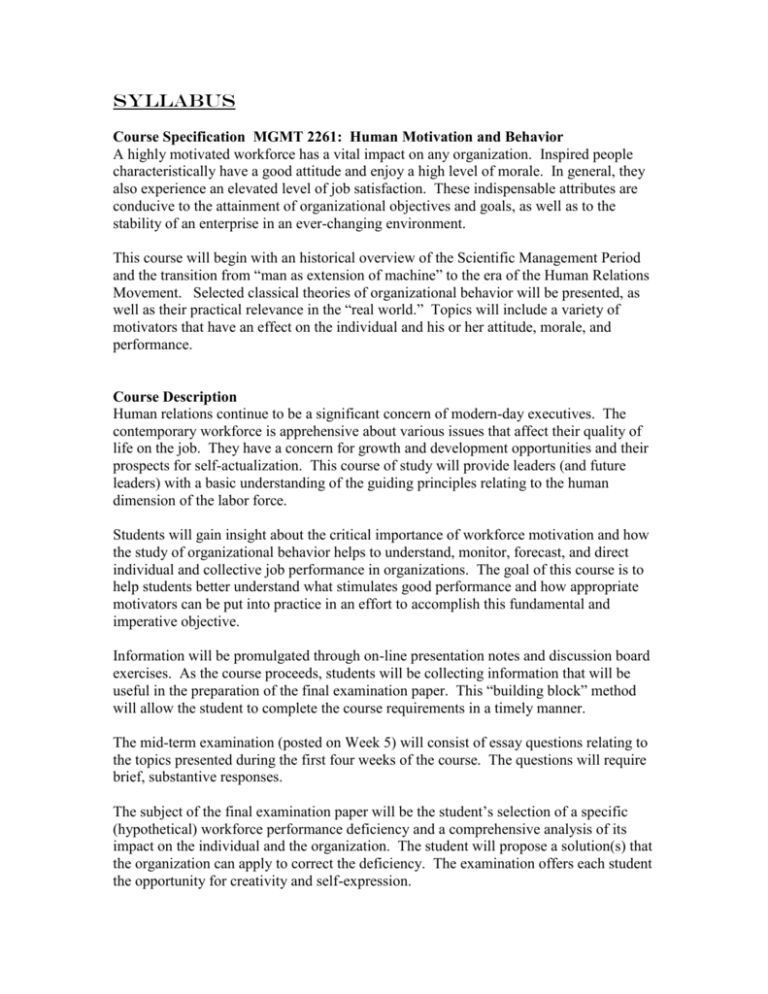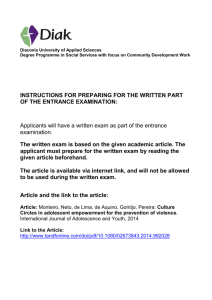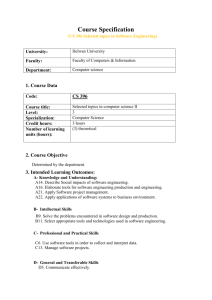Human Motivation and Behaviour
advertisement

Syllabus Course Specification MGMT 2261: Human Motivation and Behavior A highly motivated workforce has a vital impact on any organization. Inspired people characteristically have a good attitude and enjoy a high level of morale. In general, they also experience an elevated level of job satisfaction. These indispensable attributes are conducive to the attainment of organizational objectives and goals, as well as to the stability of an enterprise in an ever-changing environment. This course will begin with an historical overview of the Scientific Management Period and the transition from “man as extension of machine” to the era of the Human Relations Movement. Selected classical theories of organizational behavior will be presented, as well as their practical relevance in the “real world.” Topics will include a variety of motivators that have an effect on the individual and his or her attitude, morale, and performance. Course Description Human relations continue to be a significant concern of modern-day executives. The contemporary workforce is apprehensive about various issues that affect their quality of life on the job. They have a concern for growth and development opportunities and their prospects for self-actualization. This course of study will provide leaders (and future leaders) with a basic understanding of the guiding principles relating to the human dimension of the labor force. Students will gain insight about the critical importance of workforce motivation and how the study of organizational behavior helps to understand, monitor, forecast, and direct individual and collective job performance in organizations. The goal of this course is to help students better understand what stimulates good performance and how appropriate motivators can be put into practice in an effort to accomplish this fundamental and imperative objective. Information will be promulgated through on-line presentation notes and discussion board exercises. As the course proceeds, students will be collecting information that will be useful in the preparation of the final examination paper. This “building block” method will allow the student to complete the course requirements in a timely manner. The mid-term examination (posted on Week 5) will consist of essay questions relating to the topics presented during the first four weeks of the course. The questions will require brief, substantive responses. The subject of the final examination paper will be the student’s selection of a specific (hypothetical) workforce performance deficiency and a comprehensive analysis of its impact on the individual and the organization. The student will propose a solution(s) that the organization can apply to correct the deficiency. The examination offers each student the opportunity for creativity and self-expression. Course Outline Week 1: Syllabus and Self-Introductions Week 2: Historical Overview: The transition from the Scientific Management Period to the Human Relations Movement Week 3: Motivation, Attitude, and Morale; Determining Job Satisfaction in Organizations Week 4: Selected Historic Motivators Week 5: Mid-term Examination Week 6: Classical Motivational Theories Week 7: Contemporary Motivational Theories Week 8: Leadership in Organizations Week 9: Selected Modern-day Motivators; The Adverse Influence of Rumor and Job Stress Week 10: Final Examination Instructor Robert J. Daniello is a former police officer having served 31 years with the Cherry Hill, New Jersey Police Department retiring with the rank of Captain and the title of Division Commander. Upon retirement, Robert Daniello worked for two years as a consultant to local government with the State of New Jersey Treasury Department. He is currently an independent consultant and adjunct faculty member at FDU’s School of Administrative Sciences. Robert Daniello has earned five college degrees, including a Doctorate in Public Administration, and is a Certified Public Manager and member of the executive board of the CPM Society of New Jersey. Students can contact Robert Daniello by calling 856-667-6819. Please indicate you are an FDU student. Readings: Bringing Out The Best In People ([Latest Edition] Dr. Aubrey Daniels) Course Objectives Students will learn the basic tenets of organizational behavior, their influence on attitude and morale, and their relationship to workforce motivation and performance. Exit Competencies Students will acquire knowledge about the history of organizational behavior, and the various and sundry motivators that can be successfully and effectively utilized in the endeavor to satisfy the needs of both the individual and the organization. Assessment for Learning/Basis for Grades Presentation Notes must be read and understood before the student can participate in the Discussion Board’s electronic dialogue. Participation will be graded on the basis of timely, constructive, insightful comments and suggestions. Examination papers will be graded on the basis of substantive content as well. That is, the narrative must respond to the questions in a cohesive essay and must necessarily include the required elements. A factoring system will be used to ensure objectivity is assigning grades. Grades will range from 0.0 (F equivalent) issued to the students whose work is completely unsatisfactory and unacceptable to 4.0 (A equivalent) awarded to students whose work represents the highest level of quality. 1.0 (D equivalent) is issued for non-compliance with minimum standards. 2.0 (C equivalent) will be issued to a student whose work is below acceptable standards, and a 3.0 (B equivalent) will be given out for those students who fulfill all of the course requirements. In sum, the range of grades will be as follows: 4.0: 3.5: 3.0: 2.5: 2.0: 1.5: 1.0: 0.0: A B+ B C+ C D+ D F The final grade for the course will be an average of the percentages that appear below: Participation: Mid-term Examination: Final Examination: 20% 30% 50% Examination papers must be prepared using the APA standards and submitted electronically as an MS Word document. Papers will be reviewed by Turnitin.com®, which is an electronic system designed to detect plagiarism.






